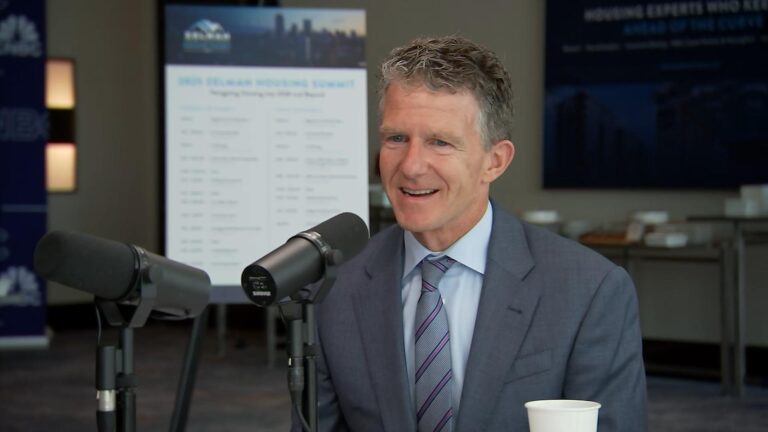
A version of this article first appeared in the CNBC Property Play newsletter with Diana Olick. Property Play covers new and evolving opportunities for the real estate investor, from individuals to venture capitalists, private equity funds, family offices, institutional investors and large public companies. Sign up to receive future editions, straight to your inbox.
The annual Zelman Housing Summit is a small but elite conference of public and private homebuilders, mortgage lenders, investors and financial analysts, run by one of the most well-known builder analysts, Ivy Zelman. When the conference started 18 years ago, it was focused primarily on residential housing. But by now the conversations have broadened – and this year’s conference focused particularly on multifamily, GSEs, labor and land.
Four years ago, Zelman’s firm was acquired by Walker & Dunlop, a commercial real estate finance and advisory company. It’s a top GSE (Fannie Mae and Freddie Mac) multifamily lender. CNBC sat down for a podcast with Willy Walker, its CEO.
Below are some highlights from our discussion and from the broader conference:
Interest rates
Much of the conversation at Zelman surrounded interest rates, as the 10-year yield dropped again Thursday when the conference began. Walker said he was surprised at where interest rates are now and doesn’t expect them to stay there.
“If you’d said to me three weeks ago that we’d have a 4.01% on the 10-year today, I would not have taken that bet,” he told CNBC. “Rates are much lower today than I thought they would be.”
But then he noted that if you go back to 1980 and look at the nine Fed rate-cut periods over that 45-year period, cuts made in a recessionary environment brought longer-term bold yields down. Outside a recession, there was really no impact on long-term interest rates.
“So as much as I’m expecting us to see at least a 25 basis point cut, and then probably another 25 basis point cut, even if you take 50 basis points out of the short end of the curve, I don’t expect it’s going to impact the long end of the curve very much,” Walker said.
Fannie and Freddie
For builders as well as multifamily developers, the future of Fannie Mae and Freddie Mac are critical, and the uncertainty around what the Trump administration will do with them was a hot topic at Zelman.
Walker noted that while commercial real estate suffered broadly in the past three years due to higher interest rates, multifamily had an advantage. When banks or CMBS issuers might not have been lending, Fannie and Freddie were always in the market to provide liquidity.
Now the conservator of the GSEs, FHFA Director Bill Pulte, as well as Treasury Secretary Scott Bessent have said there will be action to take the companies private and then ultimately to the public markets. Pulte told CNBC recently that the two would stay in government conservatorship and he expects to sell about 5% of them into the public markets.
Walker & Dunlop chairman and CEO Willy Walker
CNBC
Walker said he has a lot of concerns about the state of affairs for Fannie and Freddie, especially given recent reports of an argument between Pulte and Bessent that nearly turned physical. He likened the situation to that of flexible coworking company WeWork several years ago, which he said didn’t have a strong board to guide it.
“I’m a publicly traded company. I have a very rigorous board that has independent directors,” Walker said. “There’s nothing independent about the way that Fannie and Freddie are being managed from a board standpoint today.”
And as for the dustup between Pulte and Bessent, Walker said, “The question there would be, who takes the lead? Who’s got the pen that says this is the plan of action for Fannie and Freddie?”
Land
Also among the concerns raised around the Zelman conference halls: land.
“We don’t have a housing crisis, we have a land crisis,” said Adrian Foley, CEO of Brookfield Residential, a land developer and homebuilder on one of the conference panels.
Builders for both single- and multifamily housing say they need more land entitlements and are hoping the Trump administration will facilitate that by opening up more federal land and helping ease zoning restrictions.
“I love the equivalent of basically a CHIPS Act for housing,” Foley said in a CNBC interview.
Labor
Doug Yearley, CEO of Toll Brothers, however, said even if there were enough land to build on, there aren’t enough workers to build on it.
Smaller builders have said they’ve lost labor due to the fear of ICE raids on job sites. There was a lot of talk at the Zelman conference about training more people to get into the business, given the number of immigrant workers who fuel the industry and are being increasingly threatened with deportation.
The big public builders consistently say they’re not having major issues with ICE raids on their job sites, but they do bemoan the lack of labor overall.
“We need a healthy immigration policy,” Yearley said on a panel. “You go to any of our home sites, and it’s [like] the United Nations.”

